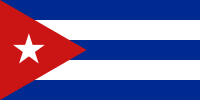 The Republic of Cuba (pronounced /ˈkjuːbə/); Spanish: República de Cuba, pronounced [reˈpuβlika ðe ˈkuβa]) is an island country in the Caribbean. The nation of Cuba consists of the main island of Cuba, the Isla de la Juventud, and several archipelagos.
The Republic of Cuba (pronounced /ˈkjuːbə/); Spanish: República de Cuba, pronounced [reˈpuβlika ðe ˈkuβa]) is an island country in the Caribbean. The nation of Cuba consists of the main island of Cuba, the Isla de la Juventud, and several archipelagos.
Havana is the largest city in Cuba and the country’s capital. Santiago de Cuba is the second largest city.
Cuba is home to over 11 million people and is the most populous island nation in the Caribbean. Its people, culture, and customs draw from diverse sources, including: the aboriginal Taíno and Ciboney peoples; the period of Spanish colonialism; the introduction of African slaves; and its proximity to the United States.
Christopher Columbus claimed the island for Spain in 1492, and the Spanish conquest began in 1511, when the settlement of Baracoa was founded. The native Indians were eradicated over the succeeding centuries, and African slaves, from the 18th century until slavery was abolished in 1886, were imported to work the sugar plantations. Cuba revolted unsuccessfully against Spain in the Ten Years’ War (1868 – 78); a second war of independence began in 1895. In 1898 the U.S. entered the war; Spain relinquished its claim to Cuba, which was occupied by the U.S. for three years before gaining its independence in 1902. The U.S. invested heavily in the Cuban sugar industry in the first half of the 20th century, and this, combined with tourism and gambling, caused the economy to prosper. Inequalities in the distribution of wealth persisted, however, as did political corruption.
In 1958 – 59 the communist revolutionary Fidel Castro overthrew dictator Fulgencio Batista and established a socialist state aligned with the Soviet Union, abolishing capitalism and nationalizing foreign-owned enterprises. Relations with the U.S. deteriorated, reaching a low point with the 1961 Bay of Pigs invasion and the 1962 Cuban missile crisis. In 1980 about 125,000 Cubans, including many officially labeled “undesirables,” were shipped to the U.S. With the demise of the Soviet Union in 1991, Cuba lost important financial backing, and its economy suffered greatly. The economy gradually began improving later in the 1990s with the encouragement of tourism and the legalization of small businesses and private employment, though diplomatic relations with the U.S. were not resumed.
In the early 21st century, Cuba benefited from a petroleum-trade agreement with Venezuela and eased some of its restrictive economic and social policies. Castro officially stepped down as president in 2008, ending his 49-year rule of Cuba; his younger brother Raúl replaced him as Cuba’s leader.
Cuban culture is influenced by its melting pot of cultures, primarily those of Spain and Africa. Sport is Cuba’s national passion. Due to historical associations with the United States, many Cubans participate in sports which are popular in North America, rather than sports traditionally promoted in other Spanish-speaking nations. Baseball is by far the most popular; other sports and pastimes include basketball, volleyball, cricket, and athletics. Cuba is a dominant force in amateur boxing, consistently achieving high medal tallies in major international competitions.
The Cuban economy has suffered severely from the collapse in 1990 of the Soviet bloc, upon whose trade Cuba was dependent; from the continuing effects of the U.S. trade boycott; and from internal structural economic problems. The economy has recovered somewhat since the mid-1990s, due to better economic planning, limited private enterprise, and an increase in productivity. In addition, the Chávez government in Venezuela, which has developed close relations with the island, sells petroleum to Cuba at subsidized prices and provides other aid.
Notes from Wikipedia and Answers.com









